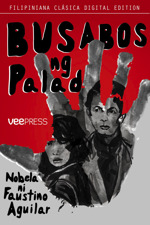 | |
| Author | Faustino Aguilar |
|---|---|
| Language | Tagalog |
| Genre | Novel |
| Publisher | Manila Filatelica |
| Publication date | 1909 |
| Publication place | Philippines |
| Media type | |
Busabos ng Palad (Pauper of Fate or The Wretched) is a Tagalog-language novel written by Filipino novelist Faustino Aguilar in 1909. Apart from tackling the "ills and injustices" in Philippine society, Busabos ng Palad revolves around love, romance, tragedy, and prostitution. The 157-page novel was published in Manila by Manila Filatelica.
Setting
The novel was written by Aguilar during a time in the American occupation of the Philippines (1898–1946) when the "cabarets and dancing halls", and similar establishments became common in Manila. These businesses became institutions that catered to men and their pleasure.
Plot
The plot of the novel narrates the love story of the protagonists Celso and Rita. Celso left Rita and their province to study in Manila. Rita disappeared from her province. In the meantime, Celso became a writer and coincidentally saves a prostitute from her fate by paying off her debt. The prostitute was Rita, his girlfriend. For two years, Rita became a victim of prostitution. Despite Rita's fate and reputation, Celso remained Rita's lover. Celso and Rita decided to live together. Rita became ill. After Rita's death, Celso became insane and was committed to an asylum.
Influence
In writing the novel, Aguilar was influenced by Camille, also known as The Lady of the Camellias, the 1848 French-language novel written by Alexandre Dumas about a "prostitute with golden heart". According to literary critic Soledad Reyes, Busabos ng Palad is one among several Tagalog-language novels that defended, with "compassion and sympathy", women who fell victim to white slavery. Busabos ng Palad is also one of the Filipino novels that condemned the institutions that created this type of "fallen women". Other Filipino writers who ventured into this theme include Iñigo Ed. Regalado, Juan Arsciwals, Ruperto Cristobal, and Antonio Sempio.
See also
References
- ^ "Busabos ng Palad by Faustino Aguilar". Vibal Foundation. Archived from the original on March 16, 2012. Retrieved June 12, 2011.
- "Busabos ng Palad (The Wretched) by Faustino Aguilar". Apple Inc. Retrieved June 12, 2011.
- San Juan, Epifanio (1974). Introduction to Modern Pilipino Literature. Ardent Media. ISBN 9780805731293. Retrieved June 12, 2011.
- ^ "Busabos ng Palad by Aguilar, Faustino". Filipiniana.net. Archived from the original on February 12, 2012. Retrieved June 12, 2011.
E. San Juan, Jr. . 2019. "Kwalta, Ang Sagradong Puta, Pagwawaldas: Politiken Sekswal sa BUSABOS NG PALAD," DILIMAN GENDER REVIEW, 2019. University of the Philippines Journal. Critical interpretation of Aguilar's novel.
External links
- Busabos ng Palad by Aguilar, Faustino (Chapters I to XII) at Filipiniana.net